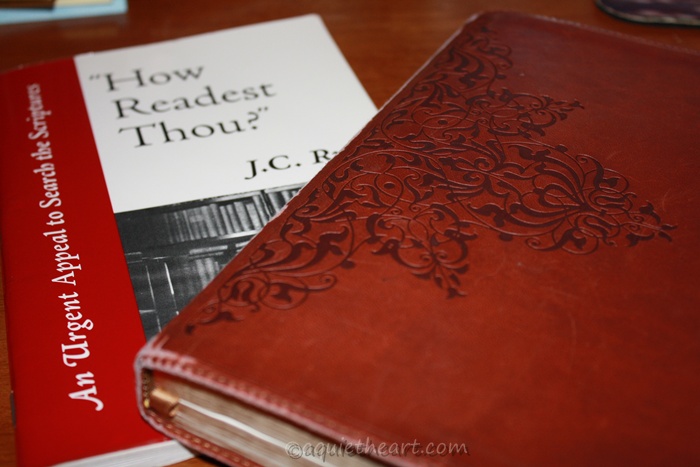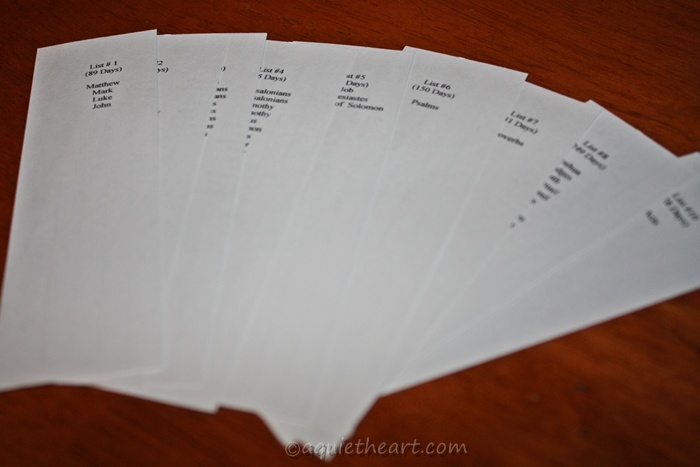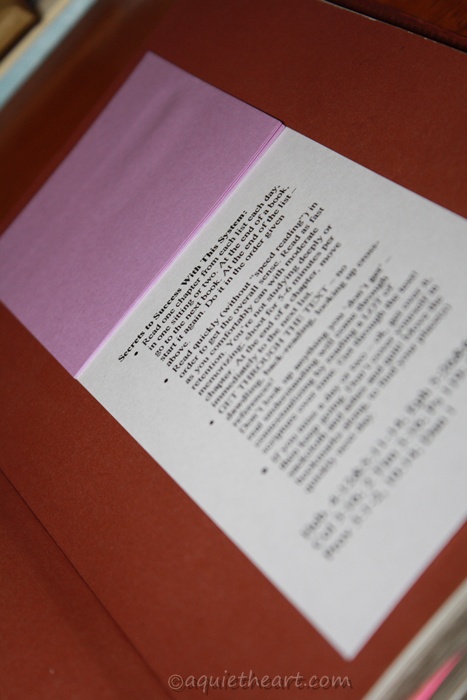2011 is (quickly!) coming to a close. I am spending some time this week re-assessing our lesson plans for the rest of the “school year.” You know…where we are “supposed to be” versus where we actually are; what I want to get done before the “end of the school year”; and how exactly to go about doing it…with the (welcome!!) addition of a new little one! 🙂
I am not really a “New Year’s Resolutions” kind of girl. Â But, the end of the year seems to be a great time to reassess and reevaluate. Â What is working well? What needs to be tweaked or changed in order to be more useful? And, what areas need a complete overhaul?
One of the most common goals or resolutions I hear this time of year is people who are purposing to read through the Bible. And, if not all of it, at the very least, reading it consistently.
“I fear many of you never read the whole Bible, and yet it is all equally divine. ‘All Scripture is given by inspiration of God, and is profitable for doctrine, for reproof, for correction and instruction in righteousness, that the man of God may be perfect.’ If we pass over some parts of Scripture we will be incomplete Christians.†~Robert Murray M’Cheyene
Surely, you’ve heard the saying, “Those who fail to plan, plan to fail.” Â While this is applicable to so many areas of life, it is especially so when it comes to spending time in God’s Word. Good intentions will only get you so far. Wanting to read the Bible is good…but it isn’t enough.
“How can one live on ‘every word that proceeds out of the mouth of God’ (Mt. 4:4) if he’s never even read every word?†~Donald Whitney
If you call yourself a Christian, you need to be in God’s Word, on a regular, consistent, daily basis. Reading it in an organized, purposeful, systematic way that will result in reading the “whole counsel of God.â€Â Hopping from chapter to chapter, with no real plan or purpose, playing favorites (by simply re-reading favorite or familiar passages), or using the “open and point†method will not accomplish that.
Over the past few years I have mentioned several Bible-reading plans on this blog. And, I have used each of them. But, while each system had its own unique qualities and benefits, I never found one that I really wanted to stick with long-term. This is purely a preference on my part. I am not, in any way, saying that there is anything “wrong†with any of these other systems. Most of them are wonderful, effective tools.  They just were not the most effective tools for me.
If you already have a Bible reading plan that you utilize, and that works for you – great! I would encourage you to keep going with it. It has taken me years to find a Bible reading plan that I absolutely love, and sincerely want to recommend, without hesitation or qualification, to others. This one:
Professor Grant Horner’s Bible Reading System
Professor Horner is a professor of English at my alma mater, The Master’s College. I had already fulfilled my English requirements by the time he came to teach at the college. So, although I never had the privilege of taking one of his classes (my husband did), I did have the opportunity to hear him teach occasionally in chapel services. And, I was also able to interact with him, following my graduation, as an employee of the college. This man loves the Lord, loves His Word, and it shows.
He developed this system almost 30 years ago, for his own personal reading. While he says it was originally based on another system, it is very different from any system that I have ever used. But, that is exactly what I like and appreciate about it. Let me offer Professor Horner’s own description of this plan (this will be a lengthy quote):
Each day you will read one chapter from each of ten lists. That’s right — ten chapters per day!!! Use ten bookmarks or sticky notes with the individual lists on them to keep track of your locations.
On day one, you read Matthew 1, Genesis 1, Romans 1, and so forth. On day 2, read Matthew 2, Genesis 2, etc. On day 29, you will have just finished Matthew, so go to Mark 1 on the Gospel list; you’ll also be almost to the end of 2nd Corinthians and Proverbs, you’ll be reading Psalm 29 and Genesis 29, and so forth. When you reach the last chapter of the last book in a list — start over again. Rotate all the way through all the Scriptures constantly.
Since the lists vary in length, the readings begin interweaving in constantly changing ways. You will never read the same set of ten chapters together again! Every year you’ll read through all the Gospels four times, the Pentateuch twice, Paul’s letters 4–5 times each, the Old Testament wisdom literature six times, all the Psalms at least twice, all the Proverbs as well as Acts a dozen times, and all the way through the Old Testament History and Prophetic books about 1½ times. Since the interweaving is constantly changing, you will experience the Bible commenting on itself in constantly changing ways — the Reformer’s principle of ‘scriptura interpretans scripturam’ — ‘scripture interpreting scripture’ in action!
…I realize that 10 chapters a day can seem daunting. But, once you begin using this system, you will see that it is quite manageable! (Yes, even, and maybe especially, for a busy mom with young children.) And, not only that, but you will probably also notice that you have been “spiritually starving.â€
Here is how it works:
The Ten Lists:
{I have each list printed on half of a 3×5 index card. I use these as my bookmarks. If you want to, and can afford it, laminating your bookmarks might be a good investment. I haven’t done that, and have periodically had to replace one, or all, of the bookmarks as they wear out.}
- List #1: (89 days)Â Matthew, Mark, Luke, John
- List #2: (187 days)Â Genesis, Exodus, Leviticus, Numbers, Deuteronomy
- List #3: (78 days)Â Romans, 1 & 2 Corinthians, Galatians, Ephesians, Philippians, Colossians, Hebrews
- List #4: (65 days) 1 & 2 Thessalonians, 1 & 2 Timothy, Titus, Philemon, James, 1 & 2 Peter 1, 2 & 3 John, Jude, Revelation
- List #5: (62 days)Â Job, Ecclesiastes, Song of Solomon
- List #6: (150 days) Psalms
- List #7: (31 days) Proverbs
- List #8: (249 days)Â Joshua, Judges, Ruth, 1 & 2 Samuel, 1 & 2 Kings, 1 & 2Chronicles, Ezra, Nehemiah, Esther
- List #9: (250 days) Isaiah, Jeremiah, Lamentations, Ezekiel, Daniel, Hosea, Joel, Amos, Obadiah, Jonah, Micah, Nahum, Habakkuk, Zephaniah, Haggai, Zechariah, Malachi
- List #10: (28 days) Acts
“If you are wondering why you should read Acts (or Proverbs) all the way through every single month, then — you’ve just shown that you need to read them that often!†~Professor Grant Horner
Prof. Horner’s “Secrets to Successâ€:
- Read one chapter from each list each day; in one sitting or two. At the end of a book; go to the next book. At the end of the list; start it again. Do it in the order given above.
- Read quickly (without “speed-readingâ€) in order to get the overall sense. Read as fast as you comfortably can with moderate retention. You’re not studying deeply or memorizing; shoot for 5–6 minutes per chapter. At the end of a chapter, move immediately to the next list.
- Do not try to look up anything you “don’t get.†Do not take the time to look up every cross-reference (you will soon begin to see those on your own, anyway!). Real understanding will come through contextualizing by reading a lot of scripture over time.
With the exception of a few (short) breaks here and there to try out other plans, or to fully concentrate on a more “in depth†study, or to prepare for teaching a Bible Study, I have been using this system for (almost) 3 years now. (And, I am beyond guilty of ignoring Prof. Horner’s last tip. I love looking things up. I can’t help myself!)
Here are a few of my own tips for utilizing this system:
Realize that this is not designed for, or intended to be an in depth study. Study is different. Reading, and familiarizing yourself with the text is an important part of studying the Bible, but it is not “studying.â€Â As Prof. Horner
says: “This is “gross anatomyâ€Â — looking at the whole body; you’re not closely studying organs or systems or tissues or cells — it is not microbiology. But microbiology and the study of organs makes more sense when you know what the whole structure of the human body is like, and how all the parts, large and small, relate in perfect interdependence.â€
You are not “behind.†Most Bible reading systems are inextricably tied to a date on the calendar. You must read “so many†chapters on a particular day. If you do not, you fall behind, and must begin playing the intimidating game of “catch-up.â€Â Not so with this plan. Yes, it is designed to have you read 10 chapters each day. But, as Prof. Horner says, “If you miss a day or two — ok, get over it, then keep going. Don’t cover yourself in sackcloth and ashes and quit! Move the bookmarks along, to find your place(s) quickly next day.â€
Make it work for your season of life. For the most part, keeping up with all 10 chapters each day has not been difficult.  But, there have been times when I have only been able to do 5 chapters each day. (I would simply use lists 1-5 on the first day, and lists 6-10 on the next, alternating until I was able go back to 10 chapters each day.) At other times, I have actually “doubled up†on the readings, doing 10 chapters in the mornings and 10 more in the evenings.  B
ut, there have also been many days when, for whatever reason(s), I have been unable to make it through more than one chapter in a sitting! So, throughout the day, as I have a free moment, I will simply pick up on the next chapter.  And, while I prefer to do it in the morning, all at one sitting, it is does allow for reading one chapter at a time without feeling “disjointed†or “disconnected.†And, on these days, it has been a blessing to have Scripture sprinkled throughout my day!
This is one of the reasons I think this system is absolutely ideal for moms! Â Large, uninterrupted blocks of time can be hard to come by. Â And, I am (eagerly!) anticipating this being the case in my own home and life in the very near future. Â But, that doesn’t mean that my time in the Word needs to disappear. Â On the contrary, I will need that time even more! And, I am so thankful to have found a plan that can flex and adapt to the changing seasons of life!
I realize that we live in the age of technology. And, I would agree that we are incredibly blessed to have the Bible at our fingertips, at any and every moment, in almost any format or translation we could possibly desire. But, the biggest “tip†I could give you would be this:

Use a Bible. A real, bound, paper and ink, “old fashioned†book. Yes, I know that there are many people out there who actually prefer using the electronic devices (computers, iPhones, etc.). And, I know that there have been programs and “apps†written specifically for this system, to make it easier for people to do so. This is my own personal preference. I prefer to use my Bible. I do all of my reading in it. I use it for study. I carry it to church. (You get the idea.) Using the same Bible, for everything, allows me to get to know my Bible. I know where specific books, passages, and verses are. And, because I always use, not just the same version, but the same Bible, I have also found this to be of great help in memorizing verses and passages.  Constantly switching up Bibles or versions can break the continuity, and the familiarity that I have with my Bible.  But, whichever you choose, the important thing is that you find a reliable version (meaning a translation, not a paraphrase) and a format that you like, and stick with it.
Lastly, I know that some will see the word “system†and automatically run for the hills crying “legalism!â€Â I don’t know how to say it more clearly: This is not a legalistic system. It is a tool. No Bible reading plan or system will make you instantaneously holy.  I am repeating myself here, but the important thing is not which system you choose. The important thing is that you are in the Word. God’s Word, not some system, is what has the power to penetrate your heart and mind…convicting, sanctifying, teaching, transforming.
“So shall my word be that goes out from my mouth; it shall not return to me empty, but it shall accomplish that which I purpose, and shall succeed in the thing for which I sent it.†~Isaiah 55:11
“Do not be conformed to this world, but be transformed by the renewal of your mind, that by testing you may discern what is the will of God, what is good and acceptable and perfect.†~Romans 12:2
“Let the word of Christ dwell in you richly, teaching and admonishing one another in all wisdom, singing psalms and hymns and spiritual songs, with thankfulness in your hearts to God.†~Colossians 3:16
“For the word of God is living and active, sharper than any two-edged sword, piercing to the division of soul and of spirit, of joints and of marrow, and discerning the thoughts and intentions of the heart.†~Hebrews 4:12
“The goal of this system is simple, and twofold: To know Scripture, and to love and obey God more!â€
~Professor Grant Horner
Amen?



I just found this system last year and love it! I find it much easier to keep up with than traditional reading plans even though it’s more than twice the amount of reading. My biggest surprise, though, was seeing sins I had wrestled with for years just fall away. I plan to steal your bookmark idea — very nice.